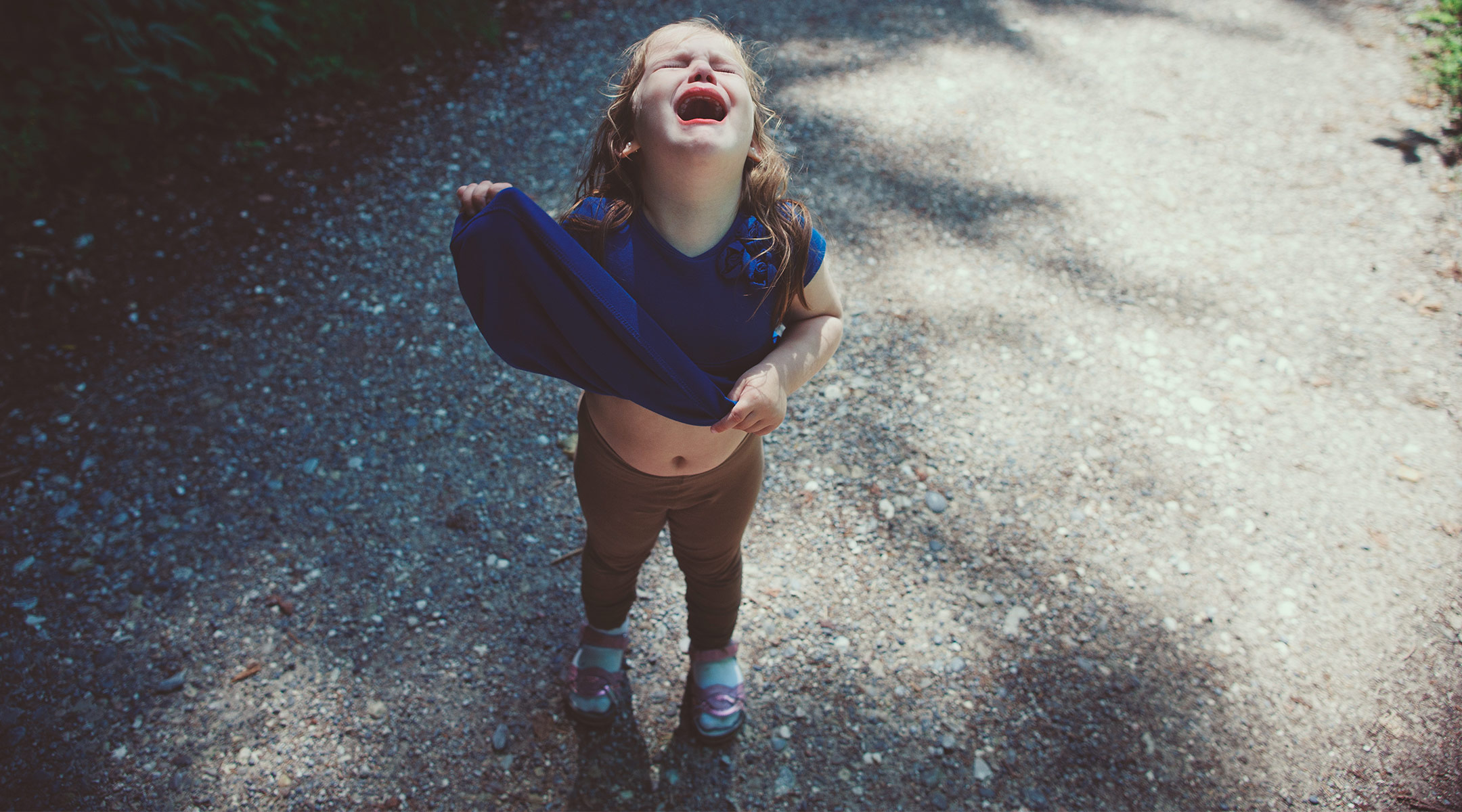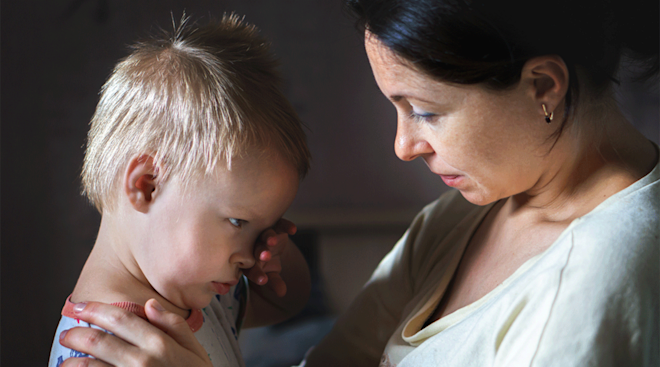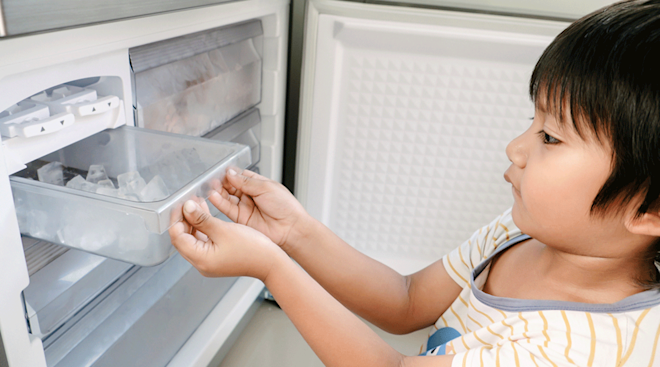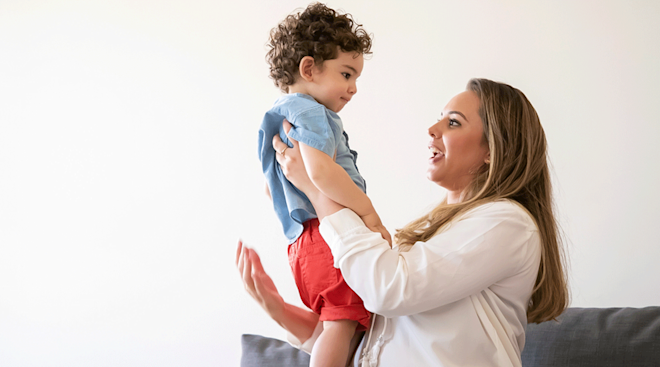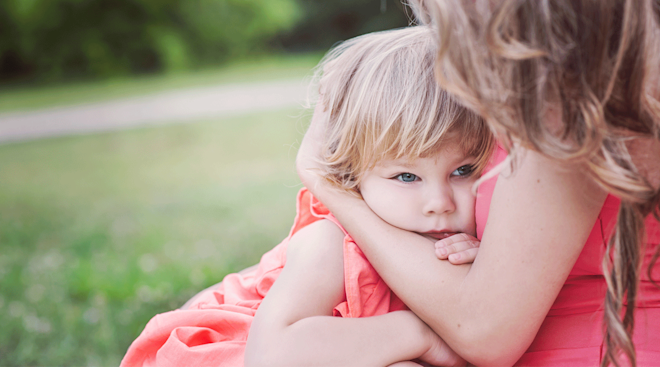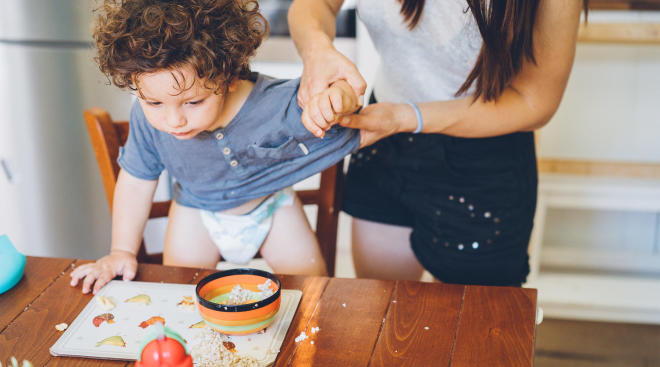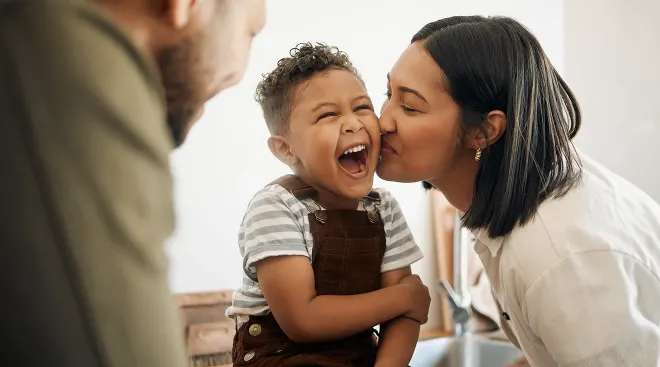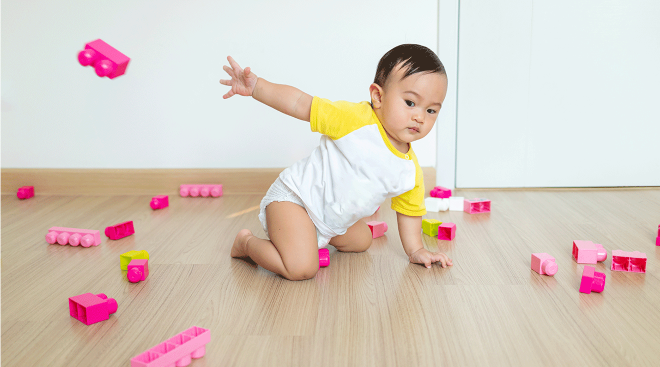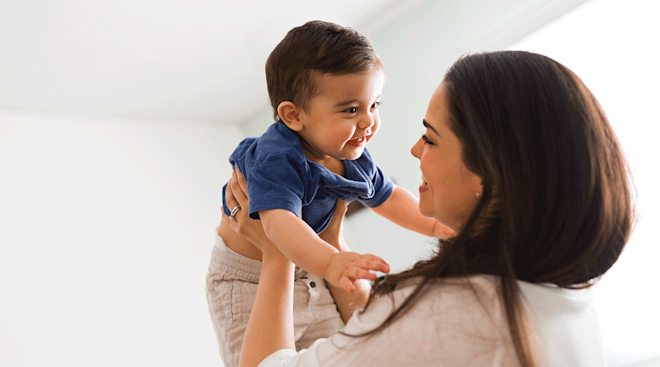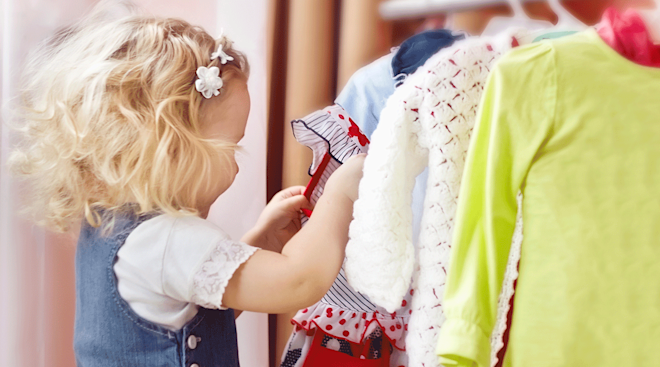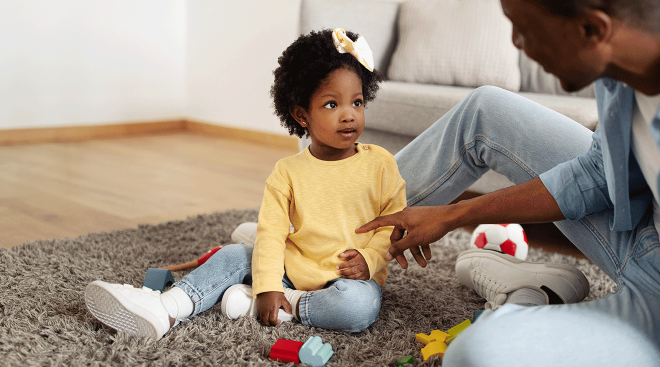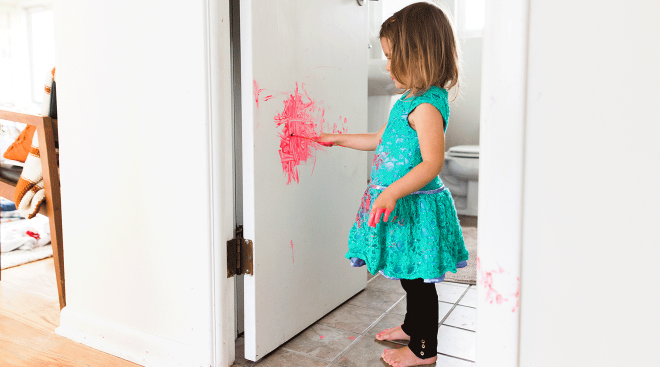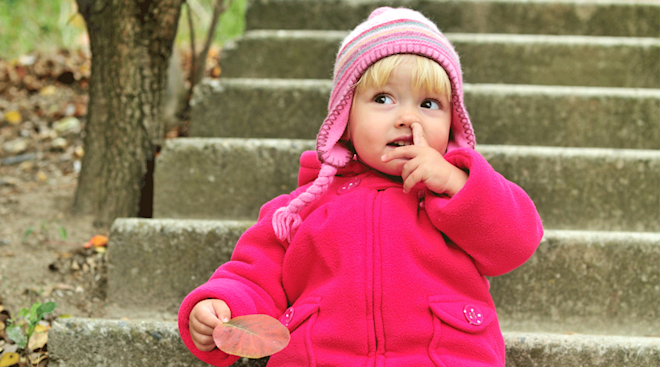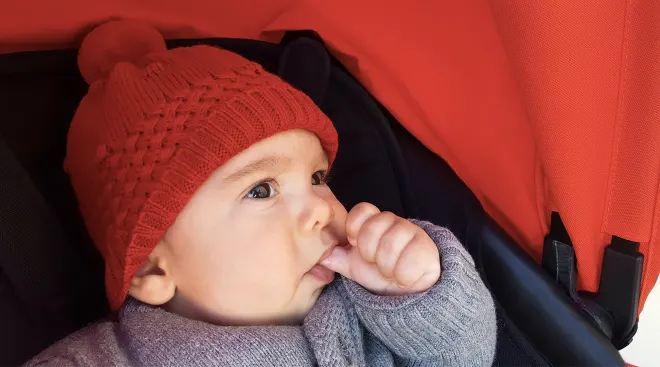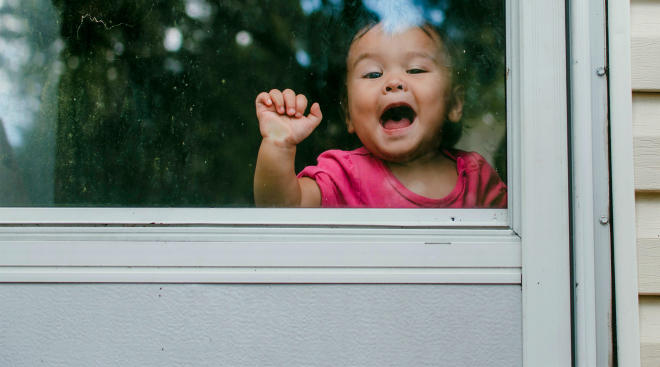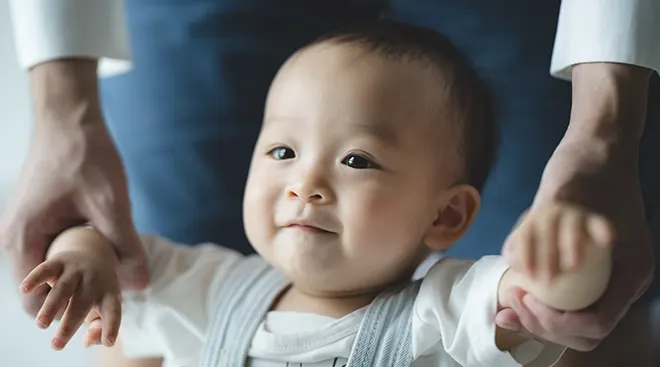Teaching Toddlers Not to Hit
Does your funny, smart, and sweet toddler turn into a prizefighter on the playground, baring his knuckles whenever anyone threatens her turn on the slide? While toddler hitting may be embarrassing and concerning, toddlers hitting others can be a common developmental phase. Learning why it happens, and how helping your toddler redirect his frustration can stop the behavior. Here, what to know about toddler hitting.
While a 2-year-old hitting may have you racking your brain to figure out what you’ve done wrong, relax. Toddler hitting is not an indictment on the way you parent; often, it’s simply a case of your toddler being frustrated, impulsive and unable to voice his feelings.
“Toddlers do not have much control over their emotional impulses and are still developing language skills,” explains Catricia Tilford, MD, a board-certified pediatrician affiliated with Rowedocs Telemedicine Network. “In addition, toddlers are egocentric. They treat their peers like objects and have little empathy.” In other words, if their classmate is playing with their favorite doll, a toddler doesn’t see the classmate as a “friend” — she sees her as an object in her way.
That said, even though toddler hitting is normal, that doesn’t mean it’s acceptable — or that you should wait for them to grow out of the behavior. Toddler hitting, which can start as early as around a year, can be stopped even if a toddler doesn’t truly understand why it’s “wrong.”
“Toddlers are capable of learning that hitting is unacceptable well before they truly understand that it’s hurtful,” Tilford says.
It’s also important to partner with your toddler’s teacher, if your toddler goes to daycare or preschool, and let them know if your toddler may be dealing with big emotions at home, which may contribute to aggressive behaviors like hitting, says Julie Kandall, education director at Columbus Preschool in New York City. “Biting, hitting, pushing and other actions that may seem aggressive typically occur when young children, who are not yet able to communicate with their words, are feeling frustrated, overwhelmed or misunderstood,” she says.
Being moved to a new classroom, being introduced to new peers, or having changes at home, like a new baby or a change in a parent’s work schedule, can all contribute to a toddler feeling overwhelmed. “Letting a teacher know about any changes can also help them watch your child a little more closely,” Kandall says.
Because toddler hitting occurs when a toddler has reached peak frustration, it’s smart to learn some of your toddler’s key frustration triggers, so you can help her calm down, talk through herfeelings, and help redirect her attention. Here, some smart ways to prevent toddler hitting.
• Learn to sportscast. “Teach your child to tell you how they feel. Validate their feelings,” Tilford says. How? Let’s say your toddler wants to play with a car her friend is currently using. Stand near them and explain: “Wow, you really want that car, don’t you? It’s frustrating when we can’t immediately get what we want, but right now, Kai is playing with the car. Let’s ask him: When he’s done, can you have a turn? Yeah? Okay, so you’ll get the car when he’s done, but for now, let’s look at the blocks.” This technique, called sportscasting, helps your toddler understand and voice the emotions that she may not yet be able to, and helps her understand that you understand and empathize with her feelings — it’s frustrating to not have a toy you want! — while being able to move past the emotions in a positive way.
• Redirect your child. If a toddler is overly aggressive in pursuit of a single toy or playground activity, it may be smart to take your toddler away from the situation and let him calm down, Tilford says. This isn’t a punishment — it’s just letting your toddler’s emotions naturally ratchet down a few levels. Let’s say your toddler is pushing or hitting to get in front of the line for the slide. Taking him away on a bench and giving him some time to breathe — and maybe suggesting a less crowded piece of playground equipment — may be the best way to handle the situation.
• Follow their cues. Sometimes, overly aggressive behavior, especially in a usually low-key kid, is a sign she may be hungry, tired, overwhelmed, or just over it, Tilford says. Instead of having her try to power through playground politics, taking her out of the situation and letting her have some solo time to decompress may be the best way to cut any negative behavior off at the pass.
• Give alternatives. While hitting is never okay, some kids find physical activity helpful to get out aggression, notes Fran Walfish, PsyD, a Beverly Hills psychologist and the author of The Self Aware Parent. “This may be punching a pillow, punching a punching bag, running around or jumping,” she says. Coming up with a list of these alternatives, and reminding your toddler all he can do, can help your toddler learn to effectively manage his emotions. This can be helpful for an older toddler, who may find talking through feelings may not make those feelings fully go away.
• Partner with their teachers. If you notice your toddler having a tendency to hit, or your toddler seems to be getting physical with you or his siblings when he doesn’t get his way, ask his teachers how they handle the behavior. “Kids sometimes behave differently in school and at home, but you and the teacher may be able to identify triggers and focus on a problem,” Kandall says. For example, if a toddler seems aggressive at home, but is generally cooperative at school, you and the teacher can brainstorm ways to help him through his big emotions at home, which could mean an earlier bedtime, special one-on-one time with a parent, or even citing his good behavior at school as something to aspire toward at home.
Not only can a toddler hitting you feel like an emotional blow, the physical blow can be intense too — those tiny fists can truly pack a punch! Toddlers hitting parents may be a common occurence, but it’s important to teach your toddler that it’s not acceptable. And while it may be tempting to react physically as well, don’t, say experts. “It’s not acceptable to hit or hurt people, and as a parent, you need to make that message clear,” Walfish says. Here, the best ways to nip hitting in the bud.
• Stick to the script. Young toddlers may not understand that hitting hurts, and may miss the message if you get overly wordy. Instead, keep things simple. If a toddler hits, say, “Ouch! Hitting hurts!,” Kandall says. If a toddler hits a friend, sibling, or partner, make a big deal out of examining the injury. If a toddler hits you, rubbing the area and saying ‘ouch’ can help him realize that hitting actually can hurt.
• Try a time out. A short time out — one minute for a 1-year-old, two minutes for a 2-year-old— not only can help them realize that hitting brings negative consequences, but can help them calm down, Tilford says. Instead of putting them somewhere by themselves, consider sitting with them for that time, talking about what went on.
• Redirect an activity. If a toddler hits, it’s a sign that the activity they’re trying to engage in may have become overwhelming. Putting it away with a gentle but firm, “Oh, you hit, so we can’t play blocks anymore,” then moving on is a good way to teach a toddler that when they hit, the fun comes to an end.
• Move on. Toddlers have short attention spans, and the hitting incident may be completely out of their minds a few minutes later. Make sure that any consequences occur immediately after the behavior, Kandall says. Withholding screen time or dessert hours after the event is confusing, and won’t help them understand the correlation between hitting and loss of privileges.
• Talk with their teachers. Again, teachers can be valuable partners in curbing this behavior. While some toddlers may hit once or twice to try out the behavior, some toddlers become habitual hitters, and handling it may differ based on which type the toddler falls into, Kandall says. If your toddler is hitting a lot, they may have a communication need that’s not met. Together, you and the teacher can assess whether your toddler may benefit from additional support. For example, a toddler with limited vocabulary may benefit from speech therapy to help her needs be understood.
A toddler also may hit himself. While this may look alarming, part of this may be experimentation — they want to know how it feels, Kandall says. In addition, they may truly not know what to do with their frustration, which is why it’s important to underline the message that hands are not for hitting anybody, even yourself. Coming up with some strategies, like running in place, jumping, or clapping loudly, may help them find something to do with their hands until they feel their emotions subside. If a toddler hitting themselves continues, speaking with their pediatrician can be helpful in determining next steps, Tilford says. A toddler who is hitting themselves may be doing so due to the sensory input it provides, and an occupational therapist could be helpful in teaching them different outlets to get a similar sensation.
Toddler hitting may be “just a phase,” but it’s important to be proactive and treat each hitting incident seriously. While the best defense against a toddler hitting is to make sure the situation doesn’t escalate, sometimes, that’s not possible. If a toddler is hitting others, it’s important to curb the behavior immediately. Here, how to stop a toddler from hitting, and discipline techniques for a toddler who hits.
• Pay attention. Shadowing your toddler at the park is a good way to notice triggers and stop issues before they start. Noticing that your toddler may become overwhelmed at multiple toys in the sandbox or too many kids in line at the slide can help you and your toddler talk through emotions, both in real time, and, if your toddler is older, as you’re recapping the day. Saying something like, “Wow, it was really tough to wait in line at the slide today, huh?” while talking at bedtime can help you and your toddler talk through emotions in a low-key way.
• Praise good behavior. When you see your toddler playing nicely, encourage the behavior with a compliment. Realizing that good behavior gets rewarded may make a toddler realize she doesn’t need to resort to hitting to get the attention she craves, Kandall says.
• Double up on toys. For young toddlers, sharing can be a tough skill, and sometimes, the best line of defense is simply making sure every toddler has a toy to play with, Kandall says. If you’re hosting a playdate, having two bottles of bubbles, or two buckets and shovels, can help preserve the peace.
• Coach a toddler. You may see some signs your toddler’s temper is rising. When you see his curled fists, raised shoulders, or whatever his physical cues are, help him learn how to redirect his behavior. “Wow, I can see you’re so angry you want to hit. Let’s get those feelings out by jumping or running!” is a way to help your toddler learn that their emotions are okay.
• Have a discipline strategy in place. Whether it’s taking them out of an activity or giving them a time out, having a consistent discipline strategy in place for a toddler who hits is key, Tilford says. If your child goes to daycare or preschool, ask the employees how they discipline, and consider mimicking that at home for consistency. In the same vein, it’s important that you make sure all caregivers, including grandparents and babysitters, follow the same strategy.
• Read a book. The book Hands Are Not for Hitting, by clinical therapist Martine Agassi, is a helpful board book to remind kids that hands can hurt, and there are better ways to make it clear that they’re not happy.
While toddler hitting mom, dad, or classmates can be disconcerting, concerning, or even embarrassing, knowing that it’s a normal developmental phase many toddlers go through can help remove the stigma of the behavior. By learning to recognize signs and discuss feelings, you can help your toddler learn to better communicate, and as your toddler simultaneously learns how to explain how she’s feeling, and learns herself that hitting can hurt, the behavior should cease. In the meantime, it’s important to realize that hitting behaviors, as unpleasant as they may be, are simply a way your toddler is communicating with you. Realizing there’s no malice behind these actions, and it’s your toddler’s way of saying, ‘hey, I need a little bit of help!’ can help you give them the support, love and strategies they need to avoid hitting in the future.
Published May 2018
Please note: The Bump and the materials and information it contains are not intended to, and do not constitute, medical or other health advice or diagnosis and should not be used as such. You should always consult with a qualified physician or health professional about your specific circumstances.
Navigate forward to interact with the calendar and select a date. Press the question mark key to get the keyboard shortcuts for changing dates.
































